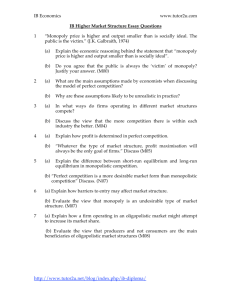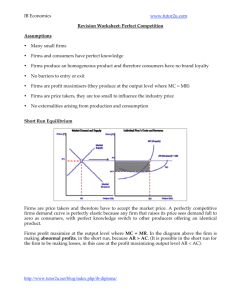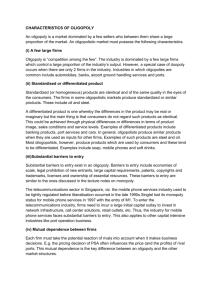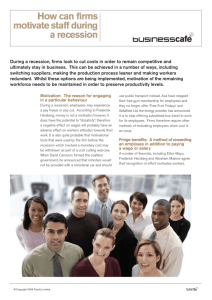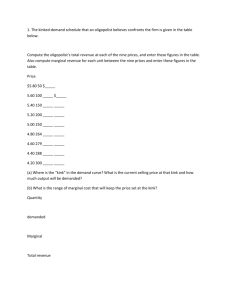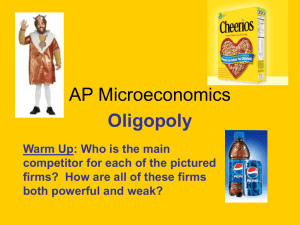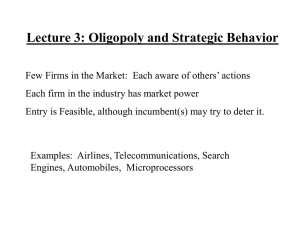Essay Plan on Oligopoly
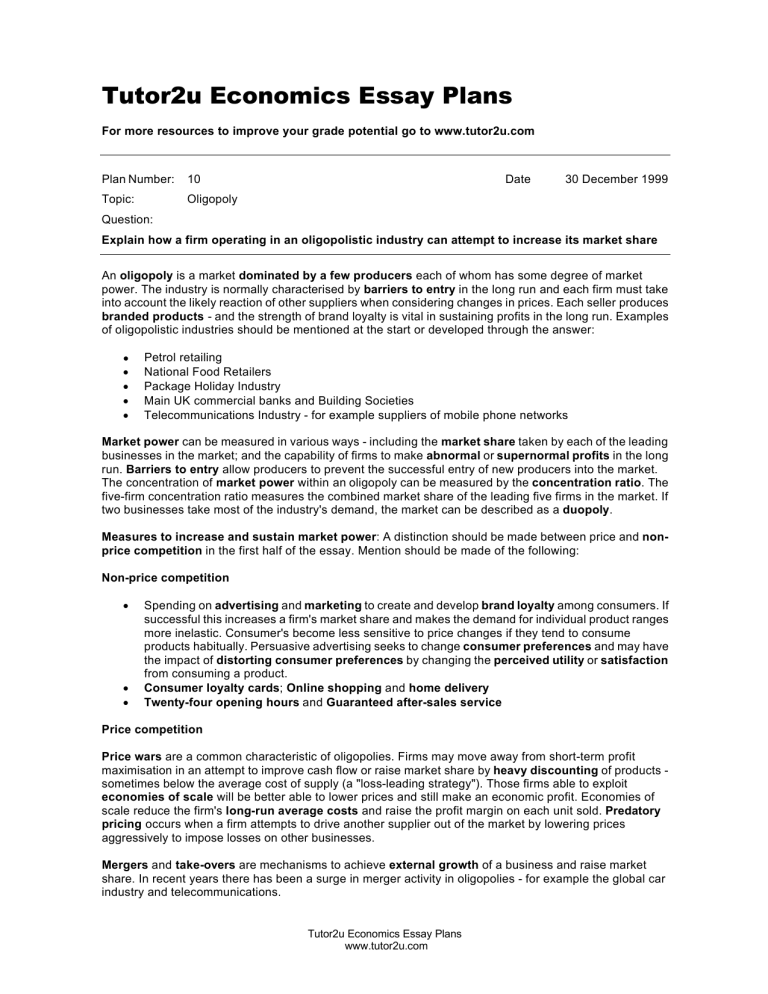
Tutor2u Economics Essay Plans
For more resources to improve your grade potential go to www.tutor2u.com
Plan Number: 10 Date
Topic:
Question:
Oligopoly
30 December 1999
Explain how a firm operating in an oligopolistic industry can attempt to increase its market share
An oligopoly is a market dominated by a few producers each of whom has some degree of market power. The industry is normally characterised by barriers to entry in the long run and each firm must take into account the likely reaction of other suppliers when considering changes in prices. Each seller produces branded products - and the strength of brand loyalty is vital in sustaining profits in the long run. Examples of oligopolistic industries should be mentioned at the start or developed through the answer:
•
Petrol retailing
•
National Food Retailers
•
Package Holiday Industry
•
Main UK commercial banks and Building Societies
•
Telecommunications Industry - for example suppliers of mobile phone networks
Market power can be measured in various ways - including the market share taken by each of the leading businesses in the market; and the capability of firms to make abnormal or supernormal profits in the long run. Barriers to entry allow producers to prevent the successful entry of new producers into the market.
The concentration of market power within an oligopoly can be measured by the concentration ratio . The five-firm concentration ratio measures the combined market share of the leading five firms in the market. If two businesses take most of the industry's demand, the market can be described as a duopoly .
Measures to increase and sustain market power : A distinction should be made between price and nonprice competition in the first half of the essay. Mention should be made of the following:
Non-price competition
•
Spending on advertising and marketing to create and develop brand loyalty among consumers. If successful this increases a firm's market share and makes the demand for individual product ranges more inelastic. Consumer's become less sensitive to price changes if they tend to consume products habitually. Persuasive advertising seeks to change consumer preferences and may have the impact of distorting consumer preferences by changing the perceived utility or satisfaction from consuming a product.
•
Consumer loyalty cards ; Online shopping and home delivery
• Twenty-four opening hours and Guaranteed after-sales service
Price competition
Price wars are a common characteristic of oligopolies. Firms may move away from short-term profit maximisation in an attempt to improve cash flow or raise market share by heavy discounting of products - sometimes below the average cost of supply (a "loss-leading strategy"). Those firms able to exploit economies of scale will be better able to lower prices and still make an economic profit. Economies of scale reduce the firm's long-run average costs and raise the profit margin on each unit sold. Predatory pricing occurs when a firm attempts to drive another supplier out of the market by lowering prices aggressively to impose losses on other businesses.
Mergers and take-overs are mechanisms to achieve external growth of a business and raise market share. In recent years there has been a surge in merger activity in oligopolies - for example the global car industry and telecommunications.
Tutor2u Economics Essay Plans
www.tutor2u.com
Discuss the various factors the Government is likely to take into account when attempting to assess whether or not a large dominant firm is operating in the public interest (13)
The public interest might be defined in terms of economic efficiency in the use of scarce resources. The answer should consider the economic welfare effects arising from monopoly and/or oligopoly power in a market. Explicit mention should be made of productive, allocative and dynamic efficiency .
Case against dominant firms with significant market power
PRICE
MC
•
Price under monopoly likely to be higher and output lower than in a competitive
Pe
AC industry
•
Dominant firm can continue to enjoy supernormal profits in the long run
Pr
ACe because of barriers to entry
•
Allocative inefficiency because monopoly price > marginal cost of supply
•
Economic welfare loss is shown by a deadweight loss of consumer surplus.
Producer is raising price above cost and
MR
AR extracting consumer surplus from the buyer
•
Productive inefficiency because output is not at the lowest point of the long run
Qm Qr OUTPUT average cost curve
Other features of monopoly and oligopoly may cause concern for possible exploitation of the public interest
•
Price collusion and other forms of anti-competitive behaviour between suppliers
•
Possible restriction of consumer choice if some firms are forced out of the industry
•
Higher costs ( X-inefficiencies ) arising from lack of effective competition in the market
•
Prices often higher than in a competitive market equilibrium - impact on real living standards
But the public interest may be served by having some dominant firms supplying the market
PRICE Large firms may exploit potential economies of scale .
Monopoly profits can be used to
Pm
Pc
P1
ACo = MCo finance important research and development spending that will improve dynamic efficiency
AC1 = MC1 through better products and more efficient production processes
Public interest can be protected through the regulation of those firms with monopoly pricing power.
Qm Qc Q1
MR
AR
OUTPUT
Mention can be made of the powers of the Office of Fair Trading and the Competition Commission within the UK and also the
European Union Competition
Authorities
Public interest needs to be judged by analysing each particular industry. If the market is contestable , the threat of potential entry by more efficient firms should help to ensure that incumbent firms operate within the public interest and do not abuse their market power.
Tutor2u Economics Essay Plans
www.tutor2u.com
